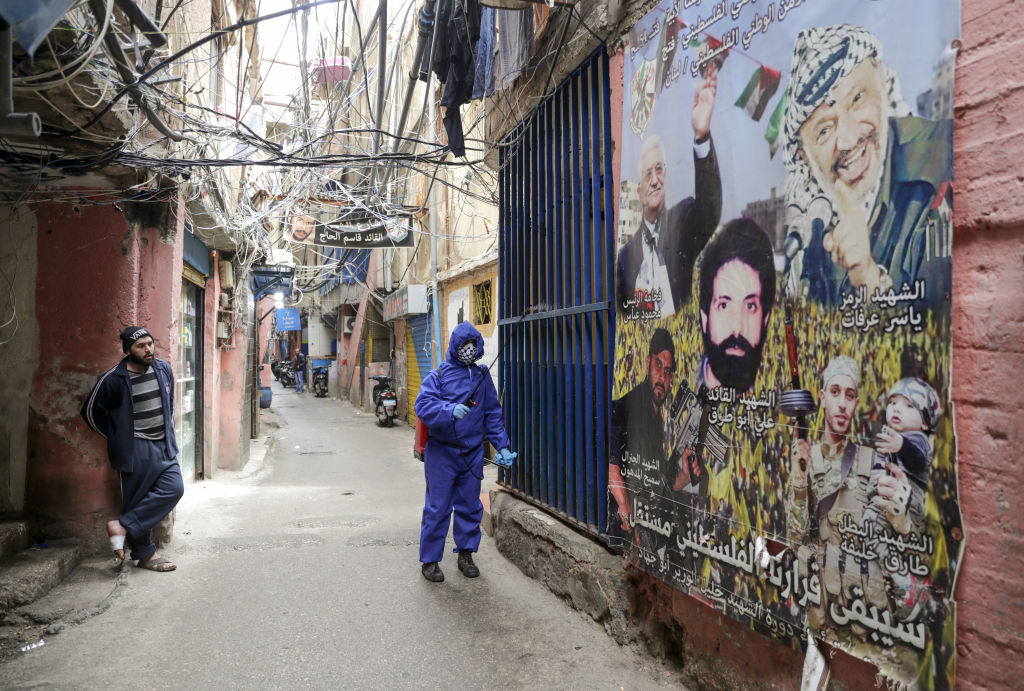In this mailing:
- Bassam Tawil: Palestinians: Don't Believe UNRWA, They Are Not Helping
- Burak Bekdil: Turkey: Erdoğan's Post-Corona, Existential Economic Challenge
by Bassam Tawil • April 15, 2020 at 5:00 am
Those considering donating to UNRWA ought first to listen to the voices of the leaders of the Palestinians in Lebanon who are accusing the UN agency of negligence and failing to fulfill its promises to help the Palestinians battle the pandemic.
Meanwhile, the Lebanese human rights activist Riad Issa alleged that UNRWA has for years failed to assist the Palestinian refugees, and that the problem did not begin with the outbreak of the coronavirus pandemic. "The crisis is not related to lack of funding," he said. "Palestinians have been complaining about UNRWA's lack of services for many years."
If the Palestinians are saying that UNRWA hasn't been helping them for years, why are the agency's heads appealing to donors for urgent financial aid?
The Palestinian public is trapped: Arabs appear to care nothing for their Palestinian brothers, while UNRWA appears to care only about collecting funds to pay the salaries of its managers and workers.

While UNRWA is boasting of its services to Palestinian refugees and asking for donations, the Palestinian refugees in Lebanon are accusing the UN agency of doing nothing to help them face the threat of the coronavirus pandemic. Pictured: A Palestinian volunteer sprays disinfectant in the streets of UNRWA's Shatila refugee camp, on the outskirts of Beirut, Lebanon, on March 24, 2020. (Photo by Anwar Amro/AFP via Getty Images)
The United Nations Relief and Works Agency for Palestine Refugees in the Near East (UNRWA) claims that it is on the "frontlines of responding to COVID-19," and its officials are appealing for donations to help Palestinian refugees in the Middle East. According to an UNRWA statement from April 5:
"UNRWA is doing its part to flatten the curve and has mobilized a number of prevention and control measures across its field of operations, including the issuing of hygiene products and protection gear to UNRWA staff, the distribution of educational pamphlets to refugees, the regular sterilization of camps and UNRWA facilities, and the support of students at home through our Education in Emergencies programme. UNRWA is committed to providing emergency relief and maintaining essential services like food assistance, education, and primary health care for the millions of Palestine refugees that depend on us, but in order to do so, we need your help."
by Burak Bekdil • April 15, 2020 at 4:00 am
Before the coronavirus, Turkey hoped its tourism revenues might reach as high as $45 billion this year. But in the first quarter of the year, the number of passengers traveling through Turkish airports fell by 18.8%, and the second quarter does not look promising. Economists agree that the year-end decline will be even sharper.
This is where alarm bells ring for Erdoğan. Turks are scheduled to go to the ballot box again in 2023 to elect the president and members of parliament.
Erdoğan owes his spectacular election victories, uninterrupted since 2002, in large part to rapid economic growth and the subsequent improvement in the standard of living. A reversal now could end his glittering political career.
Erdoğan remains the potential victim of a small virus.

Turkish President Recep Tayyip Erdoğan widely owes his spectacular election victories, uninterrupted since 2002, in large part to rapid economic growth and the subsequent improvement in the standard of living. A reversal now could end his glittering political career. Pictured: Erdoğan speaks at a press conference addressing the coronavirus crisis in Ankara, Turkey on March 18, 2020. (Photo by Adem Altan/AFP via Getty Images)
We may be months away from Covid-19's global peak but the punishing, global, post-pandemic economic repercussions will vary from one country to another, depending on what economic vulnerabilities the pandemic has caught off-guard. One anticipated outcome is to see bigger post-corona damage to economies that have a large dependence on tourism and on economies with fundamental imbalances. Turkey belongs in both categories.
In the early days of the virus, before the skyrocketing number of cases, Turkey's fragile economy boasted 4.3 million jobless. The official unemployment rate was 13.8%.
|
|
No comments:
Post a Comment